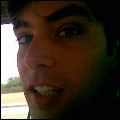Night over a small Liberal Arts college. The sky is dark as dyed felt, and the moon hangs in the windowpane like a light bulb in a Halloween diorama.
You’re a Ph.D. candidate at an English department mixer, chatting up an undergraduate over the murmur of a crowded room. Glasses clink with ice. Cigarette smoke hovers between conversations. You say something about the Brechtian significance of Reality Television. The undergrad, one Gloria, warms to your patter, asks if maybe you wouldn’t mind reading over her paper on Eugene O’Neill. You smile. Her eyes flutter over her drink. All is right in the world, or so it seems.
But look! A shadow falls on the floor. A chill withers through the room. A fellow grad student has overheard your conversation and creeps up behind you… He comments on the problems of Brechtian alienation in postmodernism.
A thunder clap! Lightning! Jacques Derrida!
Watch as the insubstantiality of his Derridean discourse wafts ghostlike into view, sucking all the life out of the conversation. How his jaws slaver! How his eyes hunger! His rhetoric is heavy-handed, yet his feet pad lightly on the shifting ground of the destabilization of lexical meaning. Dennis or Ennis or Lenny—you can’t remember his name—breathes heavily between words and brings his drink to his mouth with the lurching rhythms of one possessed. Then, just as suddenly, he shakes his head and loses his train of thought.
“What was I saying?” Dennis or Ennis or Lenny says.
“Nobody knows…” you say.
“I’m scared, Bobby!” the girl says.
“Me too, Gloria. Me too.”
A week passes. Saturday. You and Gloria spend the afternoon reciting poetry to each other in her dorm room. Wallace Stevens, Adrienne Rich, John Berryman. You read “Ode to a Nightingale” as a joke, making sure to remark on how you can only enjoy the Romantics ironically. She eats it up, marvels at your worldliness. But the naiveté of Keats’ pastoral descriptions, his reflections on death, are like a heady wine, making you both laugh, move closer. Now you’re necking on her bed. But her roommate walks in carrying a Chemistry textbook.
“Jenny! Do you mind?” Gloria says.
“Sorry, I’ve got homework…”
Jenny sighs and flops onto the adjacent twin bed. Gloria straightens her blouse. She looks at you and shrugs.
“Come on. Let’s go for a drive,” you say. “I know a place…”
“Are you crazy, Bobby? We can’t go out… Not with Derrida on the loose! He’ll deconstruct us until we don’t even exist anymore!” she says.
“Aw nuts,” you say. “That snowy-haired Frenchie’s long gone by now…”
She leans her head on your shoulder. You know she half-believes that “Truth is beauty, beauty truth” drivel you were slinging. But she’s nobody’s fool. The fear hangs there between you like the smell of a roomful of art students. Derrida can strike anywhere, any time. He’s everywhere and nowhere. In the wind, your very breath.
You and Gloria stay in and play Scrabble with Jenny, who wins the tie-breaker with the word “angst.”
The next day you have class. A split-level Shakespeare, and the room is restless. The shifting of students in their chairs eddies through the room like wind over dead leaves. The professor discusses the use of the word “nothing” in King Lear. All is quiet but for the professor’s gravelly voice.
But wait! An undergrad raises her hand. Rather innocently, she says that she “didn’t *like* the assigned reading…”
A bulb flickers. Clouds cover the sun, making a world of strange light. The clock tower sounds a low, hollow note. A grad student in the back row straightens in his chair, clears his throat.
“Oh, you didn’t like King Lear?” he says “What does like or dislike have to do with it? Perhaps your opinion preexisted textual interpretation…”
A blood-curdling scream cuts the silence! Jacques Derrida strikes again! The undergraduate stares back at him with a confused, hurt look. Her face flushes. The grad student—Jerry or Barry or Larry—weaves his knuckles behind his head.
“Lear as signifier has been disassociated with his role as king and father in the same manner in which all signifiers become separated from their signifieds…”
The undergraduate brings the back of her hand to her forehead and falls to the floor in a faint. Jerry or Barry or Larry releases deep-throated laughter. His eyes go buggy. He chokes and falls to the floor, kicking and convulsing. Demonic cackling issues from his mouth, sounding as far off and staticky as a Dictaphone recording.
“Signifiers… Deconstruction…” Jerry or Barry or Larry moans, frothing at the mouth.
He goes stiff as a dead man. A white figure rises. The specter of Derrida sways to and fro over the undergraduate’s disembodied opinion like the Devil dancing over a madman’s grave. The floating figure releases a howl of nihilistic glee, then wafts through the open window into the woods. An other-worldly scream echoes through the campus.
“That’s interesting…” the professor says, a finger to her lips. “Anyone care to comment further?”
Heed ye, reader… Be ever watchful! For of what significance are your talismans against the terror, the mortal dread that is… Jacques Derrida!
————
Nathan Pensky is a graduate student at Mills College. His work has been published in McSweeney’s and Yankee Pot Roast. He enjoys stroking his beard and studying the ancient art of animal husbandry.

